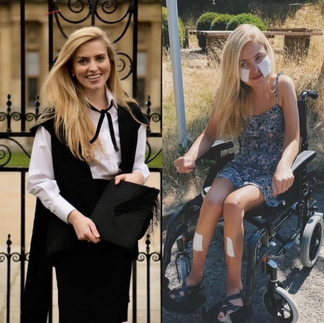By Tilly Rose
1. When did you first get symptoms?
I first became unwell when I was ten years old when my appendix burst and then I got pneumonia for the first time. Poor little ten-year old Tilly had no idea what was coming for her. Over the years, I then developed a whole host of bizarre symptoms, affecting all different parts of my body. I had several diagnoses along the way, including Tuberculosis and Addison's Disease. Whilst it was extremely important that I was treated for both of these, they never fully explained all of my symptoms and so, the mystery illness persisted.
2. How did your symptoms change over time?
My symptoms totally spiralled over time. After I received my diagnosis for Addison's Disease, I thought I was finally going to get my life back but in the years that followed, my life got out of control. I began the rounds of medics again, as more and more symptoms were added to the list.
My symptoms included: pain, swelling, muscle spasms, headache, boiling hot head, flank pain, tummy pain, muscle jerking, gut dysmotility, hugely distended abdomen, urine retention, skin burning, dizziness, nausea, involuntary muscle movements, facial twitching, tingling sensations, sweating. Then the more extreme ‘episodes’ of convulsions, visual disturbances and speech slurring.
It was horrendous. There really were times when I wasn't sure how I was going to continue.
3. How did the medics respond to your symptoms?
I found that day one, it was much easier to go to the doctor with my symptoms, as there weren't as many on the list. They could target a particular 'ologist' to send me to and examine that specific area. However, as more parts of my body were affected, the picture got more confusing. When the medics couldn't work out what was causing my symptoms, they would pass me on:
"I can't help you but I'm sure one of my clever colleagues can," they would say.
I was passed from 'ologist' to 'ologist' like a hot potato, with no one taking ownership of my case.
We would pose ideas to the medics of illnesses/diagnoses and they would so often say:
'It won't be that it's very rare'.
I used to think, but if it wasn't rare wouldn't we have found it already?
4. Were you ever admitted to hospital for your condition?
Yes, too many times to count sadly! The most daunting admission was summer/autumn 2022, where I spent almost 3 months in a London hospital. Day one the medic who admitted me used the words:
"Tilly, I am different to those other doctors. I am going to sort you."
I really believed him and, after going around in circles for so long, the relief that someone was finally going to help me, was overwhelming. When I arrived at the hospital, I was in a wheelchair and could no longer walk. My body later became totally paralysed and I was having horrendous muscular attacks which lasted hours. I had a lactate level of 11 and I was told I should be dead.
To be fair to the doctor who admitted me, at the beginning, he really did send every team to see me and ordered so many tests and scans. However, when none of them could prove what was wrong, he and all the other medics began to give up on my case. I went from being a priority, to being ignored; no one wanted to get involved, it was too complicated.
Without a label, I found I didn't even get help with symptoms. I was in agonising pain for my entire admission but I was never even seen by the pain team or prescribed strong painkillers, until the last few weeks of my admission. I saw first hand how rare, undiagnosed illnesses really do slip through the net. It remains the most traumatic admission of my life and something I would hate anyone else to go through. Attitudes towards undiagnosed illnesses have to change!
Part 2 coming later this week! Keep your eyes peeled...







Comments